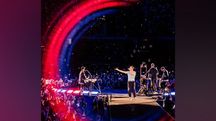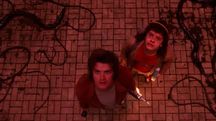
Prateek Kuhad: A night of 'Silhouettes' in Guwahati
Prateek Kuhad's soulful performance in Guwahati enthralled a large audience. The concert was part of his 'Silhouettes' tour, featuring hits from his EP, albums.
 Prateek Kuhad: A night of 'Silhouettes' in Guwahati
Prateek Kuhad: A night of 'Silhouettes' in Guwahati“You have 5 mins to get on the stage.”
Those words hung in the air like a challenge, a musical gauntlet thrown down moments before the performance that would transform a usual Sunday evening in Guwahati into something extraordinary. Prateek Kuhad, the singer-songwriter who had traversed continents with his Silhouettes world tour, stood backstage - calm, collected, almost amused.
Well, he did get on the stage in 5 mins and remained there for 1 hour and 40 mins. No fuss, no extra chatter, just him and the music that people were craving to hear.
Backstage Whispers
Backstage wasn’t a chaotic mess of wires and anxious crew members. It was a choreographed dance of precision. Walkie-talkies crackling softly, stage managers moving with quiet efficiency.
At exactly 7:30 pm, I made it to the backstage area. The interview was slotted for 7:40. As I adjusted the recorder, I saw a man in a grey shirt walk past me — calm, composed, no air of urgency. It was Prateek Kuhad.
Dev Bhatia, his manager, had earlier shared a delightful contradiction. “On camera, he might seem like a man of few words. But personally? He’s a conversationalist. Talks about everything - food, fitness, travel. He’s basically the coolest guy you’d want to hang out with.”
‘Cool’. That word would define the entire evening.

Fragments of a Musical Soul
As soon as we settled into the interview spot, recorder on, he gave off a very “boy next door” vibe. No visible arrogance, no superstar flamboyance. Just a musician, comfortable in his own skin, who had come to sing.
My recorder sat ready, a silent companion to a conversation about to unfold.
“So,” I began, my curiosity piqued by a recent discovery, “there’s this fascinating story about a Japanese band called Newspeak. Their lead singer, Rei, performed ‘Cold/Mess’ during a concert in Shillong. What does it feel like to have your music resonate across cultures?”
A hint of surprise flickered in his eyes. “Cool,” he said simply, then paused. “I mean, if I saw it, that would be interesting.”
We dove deeper. Elliot Smith emerged as a pivotal influence - a musical mentor who had shaped Prateek’s entire songwriting approach. “When I was in college, I spent almost a whole year just listening to his entire discography on loop. A lot of my songwriting foundation comes from his style,” he shared, a retrospective warmth in his voice.
The roots of his musical journey traced back to Jaipur, where he grew up surrounded by art. His parents collected art, though nobody in the family was a musician. His mother, especially, was fond of music, and he “naturally gravitated towards it” (he had once shared in another interview).

The conversation flowed like a gentle river, weaving through topics ranging from musical inspirations to the deeper significance of his tour's name, Silhouettes.
“Your tour is called Silhouettes. Like the moon tonight, it feels poetic. Does nature inspire you in this way?” I asked.
He chuckled, “I wouldn’t say I take direct inspiration from the full moon, but it definitely has an effect on me. Full moons make me feel oddly energised. The idea of silhouettes, though, is more about how we all carry different versions of ourselves. We’re one person when we’re alone, and another when we’re with others. Sometimes those versions shrink; sometimes they expand. It’s like a metaphor—shadows shifting and changing with the light.”
He talked about his titles, too — 'Cold/Mess', 'CO2'. Songs that had abstract names but weren’t random.
“The line in 'CO2' just came to me, and I called it that. It’s weird, but it stuck.”
We talked about his music and how he had carved a path for others. I asked what message he had for aspiring musicians, for those trying to carve out their own place in an often unforgiving industry. “Just keep making music. That’s all you can do as a musician. Keep creating.”

The stage awakens…
“You have 5 mins to get on the stage,” the manager’s voice cut through the backstage buzz. Prateek looked stunned. “In 5 mins?”
But that’s the thing about Prateek Kuhad. He doesn’t just meet expectations. He transforms them.
The First Notes
His shirt told a story before he even sang. An off-grey canvas splashed with abstract patterns - flowers that might have been leaves, shapes that could be parachutes or mountain ranges. It wasn’t just clothing. It was a visual metaphor for his music. Unconventional. Unexpected. Utterly captivating.
Five minutes later, he was on stage. Not a second more, not a second less. The audience, who moments ago were a restless sea of anticipation, went completely silent.
'Yeh Pal' began. The first lines – “Labon pe jo bhi ho/ Keh bhi do thehra hoon main” - hung in the air like a promise. A song over a decade old, but it felt like it was written in that exact moment, for this exact crowd.
Restlessness dissolved. Thousands of eyes fixed on the stage, mouths moving silently with lyrics. His voice - not just a sound, but a texture. Soft where it needed to be soft, powerful where it demanded power. The crowd knew every word. They didn’t just sing along; they felt along.

The stage was a living thing. Lights shifted from sunset oranges to deep blues, creating landscapes behind him that changed with every song. During '100 words', lyrics literally floated behind him - blue, purple, dancing with the music. As the stage curator, Aaquib Wani had described it, this was about “bringing experiences from start to end, like a journey. A storytelling from the other side of the show.”
By the time 'Shehron Ke Raaz' started, he’d swapped his guitar for a red electric one. Harmonising voices joined him — a group in crisp white standing subtly at the back. They were translating his emotions into sound. A slight sway during an emotional moment, a synchronised breath during a powerful chorus.
The band was tight. Drums creating a heartbeat, bass adding depth, keyboard filling spaces between words. Costume changes became part of the narrative. A black jacket with tiny fitted lights - like he was wearing a piece of the night sky. Then back to just him and a guitar. Then at the piano. Each transition, a new chapter.
For 'Just Like A Movie', confetti shot out in the air. Fireworks followed, timed perfectly with his notes. Prateek then moved to a piano, sitting down as the lights dimmed to a soft blue. It was 'Tum Jab Paas', and it felt intimate. Just him, the keys, and us.

People closed their eyes. No smartphones. No distractions. Just pure music. Some swayed. Some stood absolutely still. Each person processing the music differently. Supratik Bora, a medical student who’d waited since 2 pm to be in the front row – wasn’t just watching. He was living every moment. Eyes closed during the song, singing every word like a personal confession.
When “CO2” hit, something changed in the venue. “Maybe I was wrong and you were right / But I don't really wanna have this fight” - the lyrics cut through everything. People who were strangers moments ago now felt connected by a single emotional thread.
During 'Kasoor', the magic peaked. The backdrop played the original music video that was made of fan-sourced footage. And the same fans were right there, singing every word. Tears weren’t just happening. They were everywhere. Happy tears. The kind that say “this is exactly what I needed.”
When he sat down at the piano to perform songs from his Mulaqat EP, he shared a moment of vulnerability with the audience. "Writing this EP was an intense experience for me," he mentioned, and the venue fell into a reverent silence.
The concert hit an emotional peak when 'Cold/Mess' finally made its way into the setlist. As soon as the first chords played, the crowd erupted, yet there was a shared silence beneath the cheering, almost as if everyone collectively held their breath.

The audience at the concert wasn’t primarily from Assam; in fact, a significant portion came from neighbouring states like Arunachal Pradesh, Nagaland, and Meghalaya. This diverse crowd formed the heart of the "surila" audience—people who passionately sang along to every song, word for word.
Bullo Yami from Arunachal Pradesh, who had followed Prateek since 2015, stood with tears in her eyes during 'Mulaqat'. "I've been his fan for six or seven years. I met him in 2015 when he wasn't 'THIS' Prateek Kuhad. I became a true fan after his first song 'OH LOVE BE MINE'."
Each song was more than music. It was a memory being created.
From falsetto brilliance to head-banging intensity, Prateek demolished any preconceived notions about indie music. Who said soulful artistes can't create pure, raw energy?

The Final Notes
For the last performance, which was once again 'Kasoor', Prateek walked into the general access area. No stage. No barriers. Just pure connection.
After the show, he said something beautifully simple. “They were all smiling at me. I don’t know what I had done.”
A fan would tell you. Everything. He had done everything.
One hour and forty minutes. Five minutes to get on stage. An entire universe of sound created in between.
As I walked away, the lyrics stayed with me: “Just like a movie, the end is where we start.” The concert had ended, but it didn’t feel like the end. It felt like something beginning again.

Copyright©2025 Living Media India Limited. For reprint rights: Syndications Today








